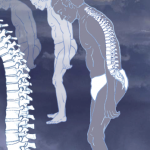NEW YORK (Reuters Health)—Secukinumab appears to improve clinical and radiographic outcomes of ankylosing spondylitis (AS) through two years of therapy, according to new results from the MEASURE 1 study.
Secukinumab is a fully human monoclonal antibody against interleukin-17A, which is implicated in various pathophysiological features of spondyloarthritis.
In a report online Dec. 13 in the Annals of the Rheumatic Diseases, Dr. Juergen Braun from Rheumazentrum Ruhrgebiet in Heme, Germany, and colleagues present an update on the efficacy and safety of secukinumab in patients with AS during the continuation phase of MEASURE 1 through two years of therapy.
Among patients who remained on secukinumab treatment through Week 104, Assessment of SpondyloArthritis international Society 20 (ASAS20) and ASAS40 rates were 73.7% and 55.7%, respectively, among patients receiving 150 mg intravenous secukinumab and 68.0% and 48.5% in those receiving the 75 mg dose.
Response rates were higher in anti-TNF-naïve patients than in patients who previously had an inadequate response to or had stopped treatment with anti-TNF agents for safety or tolerability reasons, though both groups experienced significant improvements.
Improvements were also observed in total Bath Ankylosing Spondylitis Disease Activity Index (BASDAI) and all other secondary endpoints at Week 104.
Radiographs scored using the modified Stoke Ankylosing Spondylitis Spine Score showed sustained improvements at 104 weeks, with more than 80% of patients showing no spinal radiographic progression.
Discontinuations of secukinumab due to adverse effects were infrequent, and the incidence of serious adverse effects was low.
“These longitudinal results from MEASURE 1 demonstrate that secukinumab provides similar levels of improvement in the clinical signs and symptoms of AS at two years as those previously reported during the short-term placebo-controlled period and provide the first uncontrolled data on spinal radiographic progression in patients with AS under treatment with an IL-17A inhibitor,” the researchers conclude.
“Long-term controlled studies are needed to evaluate whether secukinumab inhibits the progression of structural manifestations of AS,” they add.
Novartis Pharma AG sponsored the trial, employed three of the authors and had various relationships with several others.
Dr. Braun could not be reached for comments.
Reference
- Braun J, Baraliakos X, Deodhar A, et al. Effect of secukinumab on clinical and radiographic outcomes in ankylosing spondylitis: 2-year results from the randomised phase III MEASURE 1 study. Ann Rheum Dis. 2016 Dec 13. pii: annrheumdis-2016-209730. doi: 10.1136/annrheumdis-2016-209730. [Epub ahead of print]


